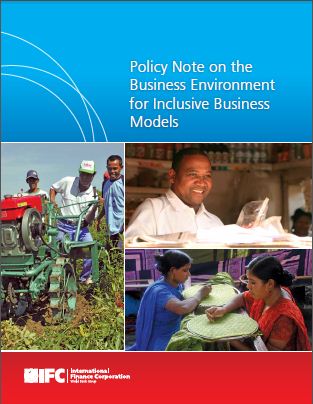 |
International Finance Corporation. 2012. “Policy Note on the Business Environment for Inclusive Business Models.” Washington, DC: IFC.
Click to view or download.
Until recently the literature on inclusive business has focused on social entrepreneurs, which tend to run smaller companies and are often startups. The focus is shifting to more established companies with inclusive business because they provide innovative solutions that sustainably reach many people at the base of the pyramid. Showcasing these homegrown businesses—generally in medium-size and large domestic companies—was the goal of the G20 Challenge. This note analyzes survey answers from the G20 Challenge applicants on the regulatory obstacles they face in their businesses. It summarizes how public policy can support business models that include people at the base of the pyramid as producers or suppliers (focusing on agriculture) and as customers (focusing on affordable housing, health, education and basic financial services). These sectors were chosen because most applicants from the G20 Challenge operate in one of them. Finally, the note offers recommendations on how governments, development finance institutions and donors can support companies with inclusive business models.
To download the file, right-click and select “Save target as…” To open the file in a new window, click once. |
|
Development Working Group of the G20. 2013. “Policy Note on Inclusive Business Policies” G20 Summit, Saint Petersburg.
Click to view or download.
This second policy paper introduces the concept of inclusive business policies, providing a framework to order and identify such policies. It builds on the experiences of the 15 winner companies of the 2012 G20 Challenge on Inclusive Business Innovation and was produced under the guidance of the two co-chairs of the G20 Pillar on “Private Investment and Job Creation” of the Seoul Multi-Year Action Plan on Development, Germany and Saudi Arabia. While opportunities to do business in low-income communities in developing countries are plentiful, companies often have trouble in establishing a sustainable business model in such environments. Market constraints drive up transaction costs and erode margins. Governments can enable inclusive business by eliminating or alleviating constraints. Inclusive business policies are a new concept and provide a fresh perspective on policies for inclusive growth. It is a useful lens to help focus on those policies that can leverage the potential of the private sector to contribute to poverty alleviation and sustainable development by doing what it is good at: business.
To download the file, right-click and select “Save target as…” To open the file in a new window, click once. |